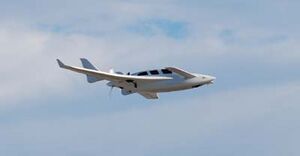Engineering:Freedom Aviation Phoenix
| Freedom Aviation Phoenix | |
|---|---|

| |
| Role | Utility aircraft |
| Manufacturer | Freedom Aviation for homebuilding |
| Designer | Freedom Aviation |
| First flight | 20 August 2007 |
| Introduction | 26 April 2007 |
The Freedom Aviation Phoenix was a single-engine four-seat United States airplane that was sold as a homebuilt composite canard aircraft.
The kit was produced at a facility on St. Lucie County International Airport at Ft. Pierce, Florida.
Design and development
The Phoenix airframe was formed of carbon-fiber composite materials on factory molds. The aircraft was assembled as a homebuilt, with a factory-sponsored builder-assist program available.
The aircraft has a swept, dihedral canard mounted ahead of the cabin, and a swept main lifting surface. Each wing has a fin (with full-length rudder) mounted about midway to the tip. In addition, the wingtips have swept winglets, which provide additional yaw stability while decreasing induced drag.
The Phoenix is powered by a six-cylinder horizontally-opposed piston engine driving a pusher propeller. The tricycle landing gear is retractable.
Only one aircraft was ever built, and the company has since gone out of business.
Specifications (Phoenix)
General characteristics
- Crew: 1
- Capacity: 3 pax / maximum 1,500 lb (680 kg) / 750 lb (340 kg) with full fuel
- Length: 22 ft 6 in (6.86 m)
- Wingspan: 34 ft 5 in (10.49 m)
- Height: 7 ft 3 in (2.21 m)
- Fuel capacity: 125 US gal (104 imp gal; 470 l)
- Cabin width: 50 in (1,300 mm)
- Cabin height: 44 in (1,100 mm)
- Cabin length: 129 in (3,300 mm)
- Powerplant: 1 × Continental IO-550 6-cylinder horizontally-opposed air-cooled piston engine, 310 hp (230 kW)
Performance
- Cruise speed: 185 kn (213 mph, 343 km/h) at 65% power
- Stall speed: 70 kn (81 mph, 130 km/h)
- Never exceed speed: 215 kn (247 mph, 398 km/h) IAS
- Range: 1,400 nmi (1,600 mi, 2,600 km) with 30 minute reserve
- Rate of climb: 1,300 ft/min (6.6 m/s)
- Fuel consumption: 0.423 lb/mi (0.119 kg/km)
External links
 |
